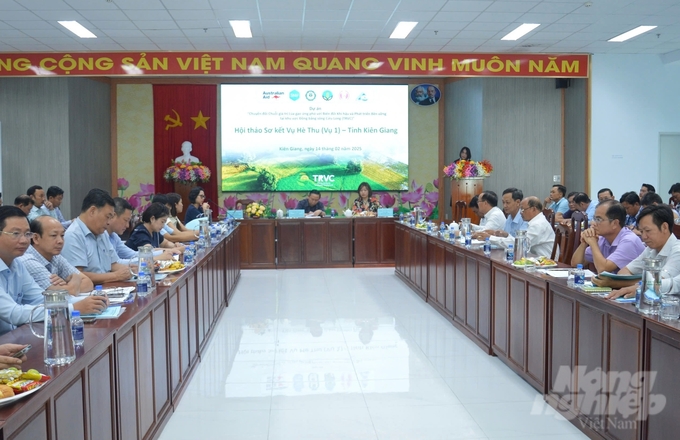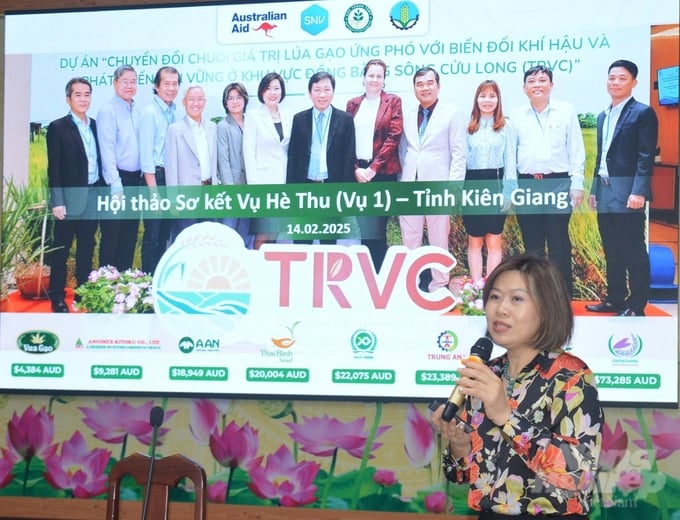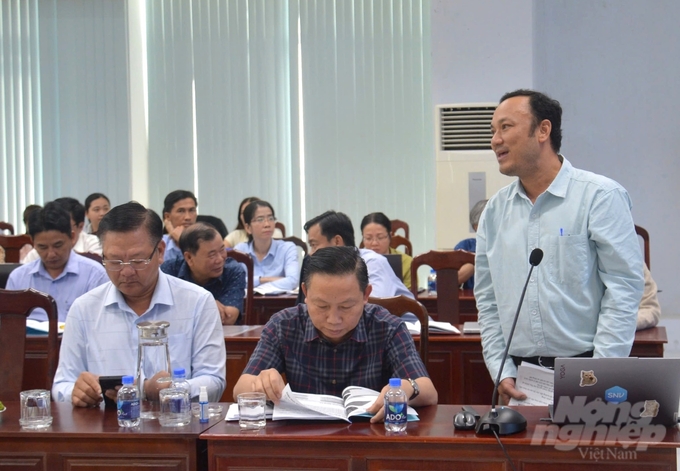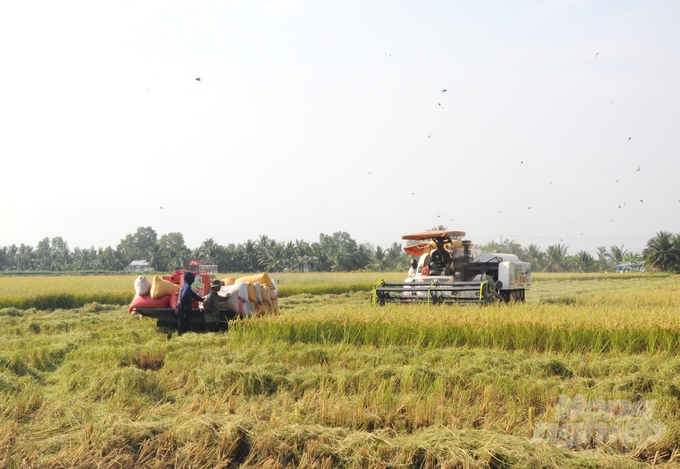May 21, 2025 | 03:52 GMT +7
May 21, 2025 | 03:52 GMT +7
Hotline: 0913.378.918
May 21, 2025 | 03:52 GMT +7
Hotline: 0913.378.918
On February 14, in Rach Gia City, the Netherlands Development Organization SNV in collaboration with Kien Giang Department of Agriculture and Rural Development organizes a workshop to review the summer-autumn crop (crop 1) of the Project " Transforming rice value chain for climate resilient and sustainable development in the Mekong Delta (TRVC)".
The workshop aims to evaluate the results of the first crop of the TRVC Project, analyze the socio-economic and environmental efficiency at the participating sites, and share lessons learned. At the same time, experts at the workshop discuss solutions to expand the area in Kien Giang province and the project implementation plan for 2025.

Netherlands Development Organization SNV in collaboration with Kien Giang Department of Agriculture and Rural Development organizes a workshop to evaluate the results of the first crop of the TRVC Project and analyze the economic - social - environmental efficiency at the participating sites. Photo: Trung Chanh.
The TRVC Project is funded by the Australian Embassy in Vietnam, the Netherlands Development Organization SNV, in coordination with the Ministry of Agriculture and Rural Development and the Departments of Agriculture and Rural Development of the three provinces of An Giang, Dong Thap and Kien Giang. The implementation period is from 2023 to 2027.
“The TRVC project pioneers the use of a results-based award mechanism to encourage and attract the participation of production and trading enterprises in the rice value chain, thereby promoting the large-scale application of advanced rice production technologies that bring higher economic value to smallholder farmers and all actors in the chain, improving rice quality, reducing greenhouse gas emissions and inclusive social values,” said Tran Thu Ha, Director of the TRVC Project - SNV.

Tran Thu Ha, Director of the TRVC Project - SNV, highly appreciated the participation of enterprises building the rice value chain in the project. Photo: Trung Chanh.
In the 2024 summer-autumn crop (crop 1), eight enterprises register to participate in the three provinces implementing TRVC with a total implementation area of 6,165 ha. The list includes Trung An High-Tech Agriculture Joint Stock Company, Angimex - Kitoku Company Limited, A An Food Joint Stock Company, Chon Chinh Import-Export Company Limited, Vietnam Rice Company Limited - Vinarice, ThaiBinh Seed Group Joint Stock Company, Xuan Phuong Kien Giang Company Limited, and Kinh Green Natural Food Joint Stock Company.
The total reduction of 27,807 tons of CO2 is recorded. The TRVC Project Management Board presents the enterprises with a reward of AUD 200,000, equivalent to over VND 3.18 billion. Enterprises then pay farmers participating in the rice value chain proportionally.
Le Van Dung, Deputy Director of the TRVC Project Management Board of Kien Giang province, said, “Of the 8 enterprises mentioned above, 6 enterprises registered to implement the TRVC Project in Kien Giang province, totaling 3,203 ha with the collaboration of 595 farming households. Through the implementation of sustainable rice production processes in this crop, rice fields cultivated by households in the competitive enterprise group have achieved much lower emissions rate compared to those with conventional practices”.

Le Van Dung, Deputy Director of the TRVC Project Management Board of Kien Giang province, gave a report on the economic - social - environmental efficiency at the locations participating in the TRVC Project. Photo: Trung Chanh.
According to the assessment results, in the 2024 summer-autumn crop, in terms of economic efficiency, farmers achieve an average profit of 54%. In terms of environmental efficiency, the total emission reduction is 12,532 tons of CO2 equivalent. As for social efficiency, 100% of participating enterprises practice integrating policies and implementing measures to ensure social equity in the chain links.
Considering the results achieved in the first crop, by the 2024-2025 winter-spring crop (crop 2), the area registered to participate in the TRVC Project in Kien Giang has increased three times, reaching approximately 10,940 ha. This is a positive sign, reflecting the potential for model expansion and the effectiveness of the project.
The TRVC Project Management Board of Kien Giang province’s target for the whole year 2025 is to have a minimum area of 13,000 ha participating in the project. In cooperatives with production linkage to participating enterprises, the rate of households applying sustainable and low-emissions rice cultivation processes should exceed 80%.

Harvesting rice at fields participating in the TRVC Project in Kien Giang. Photo: Trung Chanh.
According to Project Director Tran Thu Ha, the project aims to promote the transition to climate-resilient and low-carbon rice farming methods through the development of a sustainable rice value chain.
The project will improve the livelihoods of smallholder rice farmers in the upper Mekong Delta, reduce greenhouse gas emissions from rice production, improve rice value chain linkages, support the development of low-carbon rice brands, and the completion of a policy framework to promote low-carbon rice production.
Translated by Samuel Pham

(VAN) Khanh Hoa is investing over 545 billion VND to develop 240 hectares of high-tech marine aquaculture in order to guarantee a consistent supply of seafood exports and achieve the USD 1 billion target.

(VAN) Minister of Agriculture and Environment Do Duc Duy held a meeting with Soopakij Chearavanont, Chairman of C.P. Group, on May 15.
/2025/05/16/3800-0-nongnghiep-143756.jpg)
(VAN) Suntory PepsiCo Vietnam coordinated with the Ministry of Education and Training to implement an education program on water conservation, reaching nearly 1 million primary school students nationwide.

(VAN) Vietnam’s TH Group officially put its high-tech fresh milk processing plant into operation in the Russian Federation, marking a historic moment as the first TH true MILK cartons were produced in Russia.

(VAN) Use of high-quality broodstock and biotechnology is regarded as the most effective approach to ensuring sustainable and economically viable shrimp aquaculture ahead of climate change and the emergence of increasingly intricate disease patterns.

(VAN) Carbon farming is a form of agricultural practices that helps absorb more greenhouse gases than it emits, through smart management of soil, crops, and livestock.

(VAN) This is a key content of the Memorandum of Understanding recently signed between the Vietnam Fisheries Society and Kunihiro Inc of Japan.